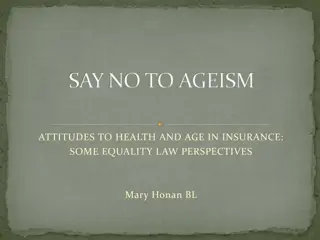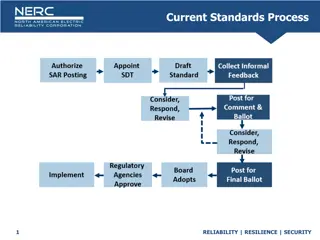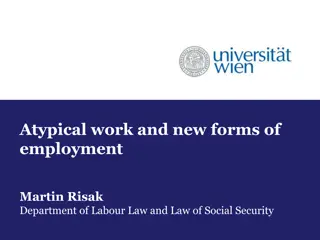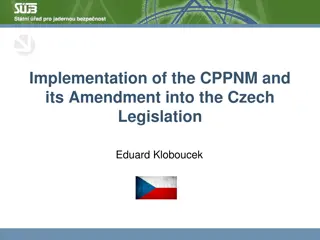EU Legislation and Directives in Employment Contracts
The case of Mangold.Case C-144/04 involves the interpretation of EU legislation, specifically Directive 1999/70, regarding fixed-term employment contracts and measures to prevent abuse. It examines the position of the national judge, questions raised, and the implications of Paragraph 14(3) TzBfG. The case highlights the importance of protecting workers' rights and ensuring fair treatment in employment relationships under EU laws.
Download Presentation

Please find below an Image/Link to download the presentation.
The content on the website is provided AS IS for your information and personal use only. It may not be sold, licensed, or shared on other websites without obtaining consent from the author. Download presentation by click this link. If you encounter any issues during the download, it is possible that the publisher has removed the file from their server.
E N D
Presentation Transcript
Mangold Case C-144/04
Position of the National Judge and Questions
EU Legislation There are three basic types of EU legislation: regulations, directives and decisions. A regulation is similar to a national law. It is binding in its entirety. Directives set out general rules to be transferred into national law by each country as they deem appropriate. A decision only deals with a particular issue and specifically mentioned persons or organisations.
Directive 1999/70 Provisions on implementation (clause 8) 3. Implementation of this agreement shall not constitute valid grounds for reducing the general level of protection afforded to workers in the field of the agreement
Directive 1999/70 Measures to prevent abuse (clause 5) 1. To prevent abuse arising from the use of successive fixed-term employment contracts or relationships . Member States shall, where there are no equivalent legal measures to prevent abuse, introduce in a manner which takes account of the needs of specific sectors and/or categories of workers, one or more of the following measures: ..
Paragraph 14 (3) TzBfG 'The conclusion of a fixed-term employment contract shall not require objective justification if the worker has reached the age of 58 by the time the fixed-term employment relationship begins. A fixed term shall not be permitted where there is a close connection with a previous employment contract of indefinite duration concluded with the same employer. Such close connection shall be presumed to exist where the interval between two employment contracts is less than six months'.
The points by National Court (1) The national provision is contrary to the prohibition of regression in Clause 8(3) of Framework Agreement in that, on the transposition into national law of Directive 1999/70, that provision lowered from 60 to 58 the age of persons excluded from protection Such a provision is also contrary to Clause 5 of the Framework Agreement
Questions by the National Court (1) (a) Is Clause 8(3) of the Directive 1999/70/EC to be interpreted as prohibiting, when transposed into national law, a reduction of protection following from the lowering of the age limit from 60 to 58? (b) Is Clause 5(1) of the Directive 1999/70/EC to be interpreted as precluding a provision of national law, such as the provision at issue in this case, which contains none of the three restrictions set out in Clause 5(1)?
Directive 2000/78 Article 6 Justification of differences of treatment on grounds of age 1. Notwithstanding Article 2(2), Member States may provide that differences of treatment on grounds of age shall not constitute discrimination, if, within the context of national law, they are objectively and reasonably justified by a legitimate aim, including legitimate employment policy, labour market and vocational training objectives, and if the means of achieving that aim are appropriate and necessary. Such differences of treatment may include, among others: .
The points by National Court (2) It is uncertain whether rules such as those contained in Paragraph 14(3) of the TzBfG are compatible with Article 6 of Directive 2000/78 the period prescribed for transposition of Directive 2000/78 into national law had not yet expired Member State may not, during the period prescribed for transposition, adopt measures that may seriously compromise the attainment of the result prescribed by the directive.
Questions by the National Court (2) Is Article 6 of Directive 2000/78/EC to be interpreted as precluding a provision of national law, such as the provision at issue in this case, which authorises the conclusion of fixed-term employment contracts, without any objective reason, with workers aged 52 or over, contrary to the principle not requiring justification on objective grounds?
Questions by the National Court (3) If one of those three questions is answered in the affirmative, must the national court refuse to apply the national provision which is contrary to Community law and apply the general principle of internal law, under which fixed terms of employment are permissible only if they are justified on objective grounds?
Overview I. Suggestion that the dispute in the main proceedings is contrives II. Directive 1999/70 III. Directive 2000/78 IV. The consequences of the interpretation adopted by the court
Question 1 (b) The question is inadmissible Reasons: 1. Clause 5 applies where there are several fixed-term contracts in succession 2. 14thRecital, the directive s purpose: to establish a framework to prevent abuse arising from the use of successive fixed-term employment contracts or relationships
Opinion of Advocate General On Question 1 a Important points: 1. The chronology of legislative provisions enacted in Germany 2. The argument by the Commission regarding the admissibility of Question 1 (a) 3. The explanation by the National Court
Question 1 a The argument of the parties The explanations from the German Govnt: The lowering of the age-limit complained of was more than offset by the introduction of new safeguards for fixed-term employees
Question 1 a The legal nature of the clause: Non-regression clause: those in recitals and those set out in the body of the directives It Has binding legal character according to the majority view among legal writers. Others commentators, however, regard it as quintessentially political
Question 1 a The legal nature of the clause: a mandatory provision was intended, imposing on Member States a full-blown negative obligation not to use transposition as a ground for reducing the protection already enjoyed by workers under existing national law.
Question 1 a This is not a standstill clause absolutely prohibiting any lowering of the level of protection that exists under national law at the time of implementation of the directive. It is rather, in my opinion, a transparency clause
Question 1 a Implementation: includes only the first legal instrument or any legislation, including any later ones? German Government: only the first implementation (TzBfG) The Advocate General: Against the interpretation of the German Govnt.
Question 1 a In the light of all that, and turning now to the case in hand, I can say right away that to my mind Germany did not violate Clause 8(3) by enacting the Hartz Law. The ground on which the Hartz Law lowered from 58 to 52 the age at which fixed-term contracts may be entered into without restriction was the need to promote the employment of older people in Germany
Question 1 a Reasons: 1. The chronology of legislations, which set age- limits 2. The report by Government Comission
Question 2 Directive 2000/78/EC: Article 6: to determine whether a national rule such as Paragraph 14(3) of the TzBfG constitutes age-based discrimination would require analysing whether there is a difference of treatment, and, if so, whether it is justified by a legitimate aim and is appropriate and necessary in order to pursue that aim
Question 2 Before the adoption of Directive 2000/78/EC The general principle of equality requires that: comparable situations must not be treated differently and different situations must not be treated in the same way unless such treatment is objectively justified' by the pursuit of a legitimate aim and provided that it 'is appropriate and necessary in order to achieve that aim.
Question 2 The difference in treatment based on age is self evident. There is an objective justification, albeit implicit, for that difference. It is more difficult, however, to determine whether that aim has been pursued by appropriate and necessary means.
Question 2 The age reduction from 55 (from the Report) to 52 Workers hired on a fixed-term basis for the first time after turning 50 The national court is right in its view that this goes beyond what is necessary in order to enhance the employability of older workers. Hartz Law applies only until 31 December 2006. The effects?
Question 2 Answer: Paragraph 14(3) of the TzBfG constitutes full- blown discrimination on grounds of age. Article 6 of Directive 2000/78 and the general principle of nondiscrimination preclude a national rule, such as the provision at issue in this case, which allows persons over the age of 52 to be employed on fixed-term contracts with no restrictions.
Incompatability with Community Law Suggestions by the Advocate General First suggestion Alternative suggestion P: deadline of transpositon of the directive not yet expired
THE JUDGEMENT OF THE EUROPEAN COURT OF JUSTICE
The Relevant Provisions of Community Law Directive 1999/70/EC-Framework Agreement: Purpose (clause 1) Scope (clause 2) Measures to prevent abuse (clause 5) Provisions on implementation (clause 8)
The Relevant Provisions of Community Law Directive 2000/78/EC: Recital (8) Recital (25) Article 1 Purpose Article 2 Concept of discrimination Article 6 Justification of differences of treatment on grounds of age Article 18 Implementation
Admissibility of the reference for a preliminary ruling Mr Helm has publicly argued a case identical to Mr Mangold s, to the effect that Paragraph 14(3) of the TzBfG is unlawful. Article 234 EC The Court may, if need be, examine the circumstances in which the case was referred to it by the national court, in order to assess whether it has jurisdiction.
Question 1 b Clause 5(1) of the Framework Agreement is supposed to 'prevent abuse arising from the use of successive fixed-term employment contracts.. The parties confirmed at the hearing, the contract is the one and only contract In those circumstances, interpretation of Clause 5(1) of the Framework Agreement is obviously irrelevant to the outcome of the dispute before the national court and, accordingly, there is no need to answer Question 1(b).
Question 1 a The National court asks the question regarding TzBfG, but the case concerns the Hartz Law The argument of Mr Mangold and the German Government Implementation cannot be a valid ground. The answer of the court to the question
The Answer 1. On a proper construction of Clause 8(3) of the Framework Agreement on fixed-term contracts concluded on 18 March 1999, put into effect by Council Directive 1999/70/EC of 28 June 1999 concerning the framework agreement on fixed- term work concluded by ETUC, UNICE and CEEP, domestic legislation such as that at issue in the main proceedings, which for reasons connected with the need to encourage employment and irrespective of the implementation of that agreement, has lowered the age above which fixed-term contracts of employment may be concluded without restrictions, is not contrary to that provision.
Question 2 & 3 As is clear from the documents sent to the Court by the national court, the purpose of that legislation is plainly to promote the vocational integration of unemployed older workers, in so far as they encounter considerable difficulties in finding work. The legitimacy of such a public-interest objective cannot reasonably be thrown in doubt, as indeed the Commission itself has admitted.
Question 2 & 3 The objective must be justified objectively and reasonably Moreover, the means used to achieve the objective must be appropriate and necessary In this respect the Member States unarguably enjoy broad discretion in their choice of the measures capable of attaining their objectives in the field of social and employment policy

















































